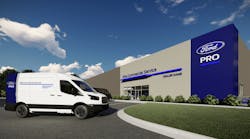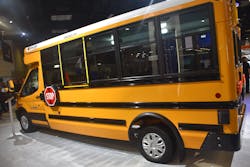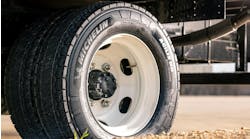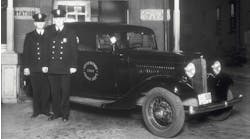INDIANAPOLIS—Ford Pro’s Work Truck Week press conference here Monday evening was less about product and more about platform, with the company rolling out a new commercial vehicle-dedicated service network as the next step in a “one-stop shop” approach that targets customer productivity, lower cost of ownership, and increased uptime.
“In May of 2021, Ford Pro announced we'd be standing up an all-new network of service facilities exclusive to commercial customers,” Tim Baughman, general manager for Ford Pro North America, told a gathering of media and customers at the expansive Ford display in the exhibit hall, introducing the Ford Pro Elite Commercial Service Center. “These centers expand the footprint of Ford Pro’s dealer network by adding 120 dedicated large-bay service hubs across the United States.”
In the U.S., Ford Pro already boasts more than 650 specialized Commercial Vehicle Center dealers, all EV-certified. The Ford Pro Elite Commercial Service program is an extension of that network.
The first facility opened in January and several more will open and break ground this year, including one in Texas in mid-April, according to the company. Much like the Commercial Vehicle Centers, Ford Pro Elite Commercial Service centers will also offer mobile service. More than 900 mobile service vans are in operation today, with the goal of 2,100 to be deployed by the end this year.
See also: Gallery: A look back at 75 years of Ford F-Series trucks
Additionally, each Ford Pro Elite Commercial Service center will have a minimum of 24 service bays for commercial vehicles and, in recognizing that many fleets utilize an equipment mix, they will service Ford and non-Ford makes and models, Baughman explained. The centers also will be required to meet EV standards and the requirements of the entire lineup of Ford commercial vehicles.
“The introduction of electric vehicles has forced fleets to rethink how they operate and how they incorporate new technologies into their existing fleet management solutions that include gas and diesel vehicles,” Baughman said.
And, again with uptime in mind—or at least to facilitate better management of downtime—Ford Pro Elite Commercial Service centers will be open a minimum of 72 hours and six days per week.
Vehicle demand
In terms of hardware, the Ford booth at the show was loaded with electric vehicles—likely to the surprise of no one who has been to Work Truck Week in the past couple of years.
Also, again to the surprise of no one in the commercial vehicle equipment industry, Ford acknowledged that pandemic-era problems persist for manufacturers.
“Shortages with semiconductors and raw materials—and raw materials stuck at the border—the labor shortages that we have, all continue, and all while we’re driving headfirst into the biggest automotive transformation in over a century,” Baughman said.
But U.S. federal actions such as last year’s infrastructure bill and the Inflation Reduction Act have pumped new funding into the economy aimed at growing the adoption of EVs, Baughman continued. And many states have announced aggressive mandates to accelerate EV-adoption timelines, while corporate sustainability goals from the country's largest companies—including Ford Motor Co.—also push for electric work-ready vehicles.
“Through it all, demand for commercial vehicles across the board has remained very strong,” Baughman said. “We know we cannot meet all of our current commercial customers’ demands, so it's great to see that demand. We continue to expect this in the year ahead.”
While Ford had no new vehicles under wraps ahead the press conference, the company provided some impressive numbers for last year’s main attraction, the E-Transit, along with the F-150 Lightning.
See also: Ford Pro: Lightning pilot shows way to grow fleet electrification
“Last year, we launched two flagship EV products, delivering more than 6,500 E-Transit vans and more than 15,000 F-150 Lightning trucks across the country through December, both earning the titles of the best-selling electric pickup and electric vans in America,” Baughman said.
Significantly, E-Transit customers have already driven more than 12 million miles in the U.S and Canada since February 2022, according to Ford. Baughman was also quick to note that while last-mile delivery applications currently garner EV headlines, the segment is only 10% of the US light-duty commercial cargo market.
Ford also stated that its E-Transit van is the best-selling electric van in the United States, Canada, and Europe. The E-Transit represents roughly 61% of the electric van market today, and of the 30 vocations recognized by S&P Global Mobility, E-Transit is the current sales leader in 28—including construction, retail, and government customers, according to Ford.
Especially in the EV market, Ford emphasizes the value of the comprehensive “one-stop shop” approach that includes the vehicles, charging infrastructure planning and financing, telematics, and service.
“Businesses that introduce EVs into their fleets must have a plan. They need to determine what charging solutions make the most sense for their business,” Baughman said. “How are they going to train their drivers and fleet managers to maximize the full potential of electric vehicle? You can't just give them the keys.”






